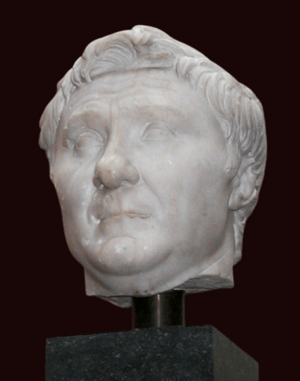Lex Gabinia de piratis persequendis facts for kids
The lex Gabinia (say "lex Gah-BIN-ee-ah") was an important ancient Roman law passed in 67 BC. It gave a famous general named Pompey the Great special powers to fight piracy in the Mediterranean Sea. This law allowed him to command a huge army and navy and control many areas near the sea, even though he wasn't holding a regular elected office. The law was suggested by a Roman official called Aulus Gabinius.
Contents
Pirates and Pompey's Big Chance

Pompey was very popular with the common people of Rome. He had won many battles before, and people admired him. However, the Roman Senate (a group of powerful leaders) was worried about him. They didn't want one person to have too much power, fearing he might become a dictator like Sulla had done just 15 years earlier.
Why the Law Was Needed
The common people, though, weren't worried about dictators. They were worried about pirates! These pirates were causing big problems. They attacked ships, stole goods, and stopped food from reaching Rome. In 68 BC, pirates even burned down Rome's port at Ostia and kidnapped two important senators.
Pompey saw this as a chance to gain more power and help Rome. He arranged for Aulus Gabinius, a tribune (a type of Roman official), to propose the law that would become the lex Gabinia.
Pompey's New Powers
The law gave Pompey a massive force to fight the pirates. He received a large fleet of warships and a big army. Some historians say he had 270 warships, 120,000 foot soldiers, and 4,000 horsemen. Others say he had even more, like 500 warships.
He also received a lot of money, about 144 million sesterces (an ancient Roman coin). He could use money from the state treasury and appoint 25 important helpers called legates. He was given three years to solve the pirate problem, which was a very long time for such a command.
A Quick Victory
Pompey was incredibly successful. He managed to defeat the pirates in just three months, much faster than anyone expected!
The law gave Pompey power over almost every Roman province within 50 miles of the Mediterranean Sea. This was a huge area! Because of this, he even had a disagreement with another Roman leader, Quintus Caecilius Metellus Creticus, in 67 BC. The people of Crete tried to get better peace terms from Pompey than they were getting from Metellus, who was trying to calm things down in Crete.
What the Law Meant for Rome's Future
The lex Gabinia did more than just stop pirates. It showed that the Roman Republic's vast empire could be controlled by one powerful person.
Before this, Sulla, a dictator, had tried to make the Senate stronger and reduce the power of the common people. But Pompey's career showed that Sulla's changes weren't really working. Power wasn't being shared among the rich families as intended.
A New Way of Ruling
Giving so much military power to one person, especially someone who wasn't even a senator before becoming a consul (a top official), set a new example. It showed that military power could be very centralized, meaning one person could be in charge of everything. This idea later became important for how the Roman Empire was run.
During the Roman Empire, this law was used as a reason for emperors like Augustus to have great power over the entire empire. The part of the law that let Pompey appoint his own helpers (legates) was also a preview of how emperors would later appoint their own deputies in the provinces. Because this happened during the Republic, Augustus could claim his actions were in line with "mos maiorum" (the ways of the ancestors), which helped him gain trust when he said he was restoring the Republic.
See also
- Roman law
- List of Roman laws

